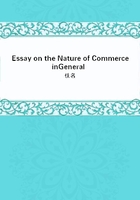
第51章
Navigation is an essential point in foreign trade. In the whole of Europe the Dutch are those who build ships the cheapest.
Timber is floated down to them by river, and the proximity of the north supplies them at less expense with masts, wood, pitch, rope, etc. Their windmills for sawing wood facilitate the working of it. Also they navigate with smaller crews and their sailors live very cheaply. One of their windmills for sawing wood saves the labour of 80 men a day.
Owing to these advantages they would be the only sea carriers in Europe if cheapness only were followed. And if they had enough of their own raw material to form an extensive commerce they would doubtless have the most flourishing maritime service in Europe. But the greater number of their seamen does not suffice without the interior strength of the state, for the superiority of their naval power. They would never arm warships nor sailors if the state had large revenues to build the ships and pay the men: they would profit in everything from extended markets.
England, in order to prevent the Dutch from increasing at her expense their advantage on the sea by this cheapness, has forbidden any nation from bringing into England other merchandise than that of their own growth. In this way, the Dutch being unable to serve as carriers for England, the English have strengthened their own shipping. And though they sail at greater costs than the Dutch the wealth of their overseas cargoes renders these costs less considerable.
France and Spain are maritime states which have rich produce sent to the north, whence goods and merchandise are brought to them. It is not surprising that their shipping is inconsiderable in proportion to their produce and the extent of their seaboard, since they leave it to foreign vessels to bring them all they receive from the north and to take away from them the goods which the states of the north receive from them.
These states, France and Spain, do not take into account in their policy the consideration of trade in the way in which it would be advantageous. Most merchants in France and Spain who have to do with the foreigner are rather agents or clerks of foreign merchants than adventurers carrying on the trade on their own account.
It is true that the states of the north are, by their situation and the vicinity of countries which produce all that is needed for building ships, in a position to carry everything cheaper than France and Spain could do. But if these two kingdoms took steps to strengthen their shipping, this obstacle would not prevent them. England has long since partly shown them the example. They have at home and in their colonies all that is needed for the construction of ships, or at least it would not be difficult to get them produced there, and there is an infinity of methods that might be used to make such a policy successful if the legislature or the ministry would concur in it. My subject does not allow me in this essay to examine these methods in detail. I will limit myself to saying that in countries where trade does not regularly support a considerable number of ships and sailors it is almost impossible for the prince to maintain a flourishing navy without such expense as would be capable by itself of ruining the treasure of his state.
I will conclude than by observing that the trade most essential to a state for the increase or decrease of its power is foreign trade, that the home trade is not of equally great importance politically, that foreign trade is only half supported when no care is taken to increase and maintain large merchants who are natives of the country, ships, sailors, workmen and manufacturers, and above all that care must always be taken to maintain the balance against the foreigner.